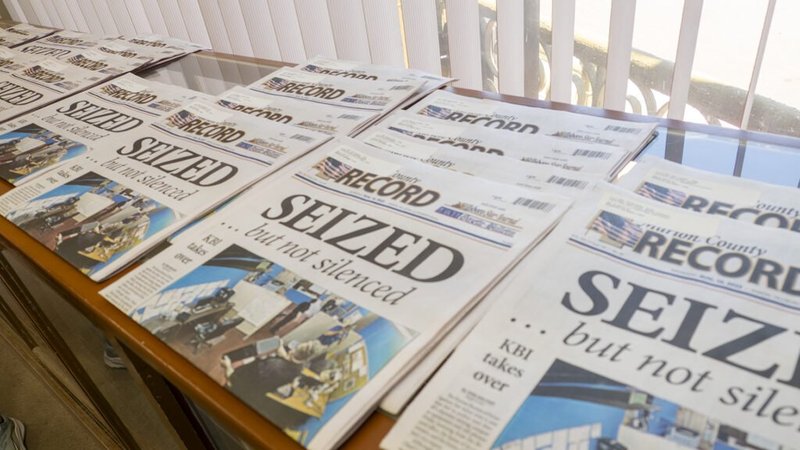
In an aggressive escalation of its already disturbing crackdown on leaks, Trump’s Justice Department secretly obtained a year’s worth of phone calls and email records of Ali Watkins, a New York Times reporter who previously covered national security issues for Buzzfeed.
As the New York Times reported on Thursday evening:
Investigators sought Ms. Watkins’s information as part of an inquiry into whether James A. Wolfe, the Senate Intelligence Committee’s former director of security, disclosed classified secrets to reporters. F.B.I. agents approached Ms. Watkins about a previous three-year romantic relationship she had with Mr. Wolfe, saying they were investigating unauthorized leaks.
The phone and email records seized by the government, which Watkins was notified about after the fact and was therefore unable to challenge in court, included “those associated with her university email address from her undergraduate years,” according to the Times.
The New York Times released a statement saying, “This decision by the Justice Department will endanger reporters ability to promise confidentiality to their sources and undermine the ability of a free press to shine a light on government actions. That should be a grave concern to anyone who cares about an informed citizenry.” Buzzfeed editor in chief Ben Smith tweeted, “We are deeply troubled by what looks like a case of law enforcement interfering with a reporter’s constitutional right to gather information about her own government.”
At virtually the same time the New York Times story broke, the Justice Department announced it has indicted Wolfe for allegedly lying to investigators about his contact with reporters, but at least so far, has not charged him with leaking any alleged classified information.
The indictment of Wolfe released by DOJ—which, as always, should be taken with a huge grain of salt—mentions at least three other unidentified reporters. The indictment contains the content of conversations Wolfe allegedly had with multiple reporters on Signal, an encrypted messaging application. It’s unclear at this time whether those unidentified reporters had their phone and email records directly surveilled as well.
The indictment also does not make clear how the Justice Department accessed the messages—given Signal provides end-to-end encrypted texting that can only be read by the sender and receiver of the messages—but the most likely explanation is that investigators gained physical access to Wolfe’s phone. There is so far no evidence Signal’s security protections have been compromised, but it’s a reminder to all journalists to take every precaution possible when speaking with sources—even when using encryption.
While this is the first publicly known instance of the Trump administration directly surveilling a reporter to attempt to root out their source, there are undoubtedly others. Attorney General Jeff Sessions has previously stated the Justice Department has tripled the number of leak investigations since President Obama was in office and has talked about “revisiting” the agency’s media guidelines. These rules are intended to prevent the seizure of journalists’ communications records in all but extreme cases.
(Freedom of the Press Foundation, along with the Knight First Amendment Center at Columbia, is currently suing the DOJ to learn more about how they currently conduct surveillance of journalists and how they plan to “revisit” those guidelines.)
Regardless, it certainly seems like the Justice Department may have violated these internal guidelines as part of this case, which require the Justice Department “exhaust” all other means of investigating before considering directly going after a journalist. As reporter Barton Gellman pointed out, it appears that investigators already had access to Wolfe’s phone, and by subpoenaing Watkins’ personal records, they almost certainly would be able to uncover other confidential sources.
The Wolfe indictment marks the third alleged source of journalists prosecuted by the Trump administration. All leak investigations — whether they directly target reporters or not — are a grave threat to press freedom. Whistleblowers are the lifeblood of reporting, and the Trump administration is directly attacking journalists’ rights by bringing these cases.
It should be pointed out that the targeting of journalists and their sources is not unique to Trump. As the New York Times also noted, “The seizure...suggested that prosecutors under the Trump administration will continue the aggressive tactics employed under President Barack Obama.”
Sadly, as we detailed when Trump was elected, President Obama’s Justice Department laid the groundwork for the current crackdown on leaks and journalism we are currently seeing from Trump and Sessions. Led by former Attorney General Eric Holder, the previous administration prosecuted more leak cases than all other previous administration combined.
Several of those cases involved directly spying on reporters by subpoenaing their phone lines, accessing the content of a journalist's email, and other disturbing tactics that exposed travel records, financial records and more. The Obama-era Justice Department also gutted reporter’s privilege in the Fourth Circuit, home to many of the country’s intelligence agencies.
Obama and Holder certainly deserve scrutiny for the previous administration’s shameful record on press freedom and the precedent it set. But now Trump and Sessions, who have long been avowed enemies of the press, are poised to take it to even more dangerous heights.
Ali Watkins is an excellent reporter. She is having her private records scrutinized and spied on by the government for doing her job as a journalist, and the Justice Department’s move should be loudly condemned by everyone no matter your political preference.



